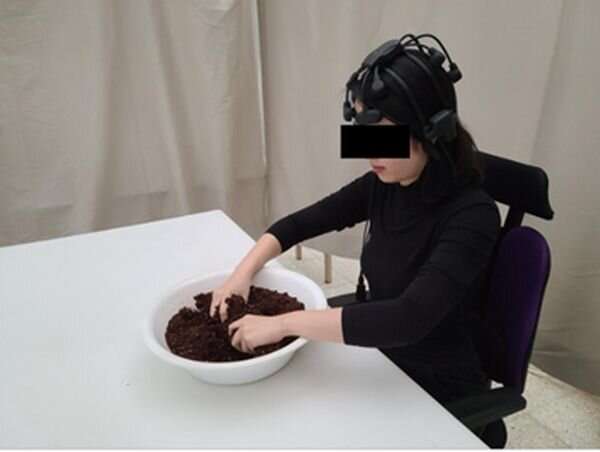Credit: Sin-Ae Park
Researchers at Konkuk University in the Republic of Korea conducted a study to measure the effect of a soil-mixing activity on the psychological and physiological responses of humans, according to the presence or absence of Mycobacterium vaccae microorganisms in the soil.
Previous studies on the connection between human health, well-being, and nature have primarily focused on green plants, predominantly in the form of holistic and synergistic approaches that combine plants and soil. These studies have shown that staring at green plants or working in an environment with green plants leads to physiological and psychological relaxation. To understand the therapeutic mechanism of horticultural activities and nature-based therapy clearly, the researchers turned their attention to the effects of interactions with soil, soil microorganisms, and plants.
Mycobacterium vaccae is a species of nonpathogenic bacterium that lives naturally in soil. Depending on the presence or absence of M. vaccae microorganisms in the soil, the effects of a soil-mixing activity on human metabolic and autonomic nervous system responses will be different.
The soil-mixing activity with M. vaccae showed an increased level of organic acids (including lactic and pyruvic acids and serotonin) and decreased levels of fatty acids and lipids (including palmitic and linoleic acids). This could contribute to improvements in psychological health. In addition, the alpha wave of the occipital cortex increased, and the heart rate decreased, resulting in a stabilizing effect on the autonomic nervous system. This study results suggest that human contact with and exposure to soil and microbes correlates with human health for both psychological and therapeutic aspects.
Experiment protocol used in this experiment to investigate the effects of the Mycobacterium vaccae soil on the physiological responses of humans during the soil-mixing activity. Credit: Journal of the American Society for Horticultural Science (2022). DOI: 10.21273/JASHS05146-21
The results could lead to the development of soil with therapeutic functions for relevant participants, such as older adults and people with disabilities, and the development of long-term programs using soil for maintaining and promoting health.
The paper is published in the Journal of the American Society for Horticultural Science. This study was conducted under the supervision of Sin-Ae Park, a professor in the Department of Bio & Healing Convergence, Graduate School at Konkuk University, Seoul, South Korea, and the International People Plant Council Chair. She has written many articles related to the relationship of physical activity and gardening, and Horticultural Therapy.
More information: Seon-Ok Kim et al, Physiological Responses of Adults during Soil-mixing Activities Based on the Presence of Soil Microorganisms: A Metabolomics Approach, Journal of the American Society for Horticultural Science (2022). DOI: 10.21273/JASHS05146-21
Journal information: Journal of the American Society for Horticultural Science
Provided by American Society for Horticultural Science

























